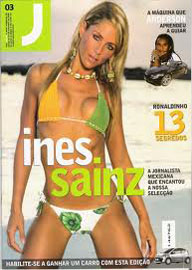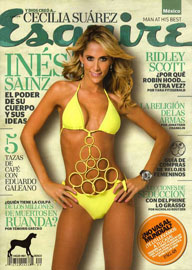
September 15, 2010

But then, it seems (and here we have the crucial moment), a fellow female reporter told her she SHOULDN’T STAND to be TREATED in such a manner. The name and affiliation of this interlocutor hasn’t been given, but it seems quite clear to me that she, not Sainz, is the originator of this controversy. She, not Sainz, the object of all of the attention, is the one who truly took offense to the players who had the audacity to whistle at a shapely, provocatively-dressed woman.
I think we can safely assume that the unnamed female reporter who encouraged Sainz to take steps to rectify this terrible wrong is a less attractive woman than Sainz. Though it sounds rude for me to say this, I don’t mention it in order to put her down, but simply to point out the irony of the situation. Sainz, the alleged victim of (ooh! aahh!) sexual harassment, has become the current cause celebre of women’s groups quite in spite of herself. She’s been dragged along for the ride, and she’s consented, though she seems hardly to understand the significance of it all.
Witness this CNN report, in which thick-eyebrowed anchor Rick Sanchez, in absurdly straight-faced and pompous fact-checking mode, questions Miss Sainz with solemn intonation, as if this silly bit of (not even literal) grab-ass were the most important story since the destruction of the Hindenberg—ah, the humanity! Miss Sainz, speaking in broken English, isn’t reading from any script; she’s trying to describe what happened, but doesn’t really know what to say. She seems to know that a lot of women are offended on her behalf, but she doesn’t seem particularly bothered personally. (And why SHOULD she be? Her looks and figure, and the attention she gets from men are in large part what’s gotten her where she is in her career: why bite the lecherous hand that feeds you?)
 THEN watch as fellow reporterette Brooke Baldwin, upbraids Sainz for being overly-casual in her response to the players’ verbal come-ons, which sends the message that such boorishness is “acceptable.” What makes this dialogue particularly interesting is the paternalistic condescension of Baldwin towards Sainz—the sophisticated, white, Western professional woman laying into this Third World Hooters-waitress-like bimbo for her lack of proper feminist consciousness. Sainz, sensing her cue, then makes clear that OF COURSE she’s bothered by how she was treated, but the discerning viewer doubts her sincerity; she’s saying what her puppet masters want her to say. Once they get out of her face, we can safely predict, she’ll happily go back to her former slutty-dressing ways. Again, though she’s involved, this clearly isn’t her fight—she’s a prop, a stooge, nothing more.
THEN watch as fellow reporterette Brooke Baldwin, upbraids Sainz for being overly-casual in her response to the players’ verbal come-ons, which sends the message that such boorishness is “acceptable.” What makes this dialogue particularly interesting is the paternalistic condescension of Baldwin towards Sainz—the sophisticated, white, Western professional woman laying into this Third World Hooters-waitress-like bimbo for her lack of proper feminist consciousness. Sainz, sensing her cue, then makes clear that OF COURSE she’s bothered by how she was treated, but the discerning viewer doubts her sincerity; she’s saying what her puppet masters want her to say. Once they get out of her face, we can safely predict, she’ll happily go back to her former slutty-dressing ways. Again, though she’s involved, this clearly isn’t her fight—she’s a prop, a stooge, nothing more.
The gambit has worked, to some extent: Jets owner Woody Johnson has personally apologized to Sainz for the extraordinarily sinister whistling, hooting, hollering, and flirting indulged in by many members of his team: Johnson agrees that such behavior is, in the prissy, schoolmarmish parlance of political correctness, “unacceptable.” (Sainz says she accepts the apology.)
Still, one wonders how many more Pyrric victories like this contemporary feminism can handle. Most people still have access to common sense, and common sense tells us that if a woman wants to avoid getting leered at, she should avoid dressing like a streetwalker and visiting a locker room full of half-naked men.
 Of course such considerations will never deter those for whom ideology trumps reality, who can’t resist viewing women as perpetual victims and men as dangerous predators, and who view every unwanted or unwelcome comment directed at a woman as a horribly egregious case of sexual
Of course such considerations will never deter those for whom ideology trumps reality, who can’t resist viewing women as perpetual victims and men as dangerous predators, and who view every unwanted or unwelcome comment directed at a woman as a horribly egregious case of sexual
harassment, tantamount to rape. Feminists who don’t subscribe to these extreme, simplistic, and rather bigoted views should make sure to distance themselves from the phony spectacle surrounding Ines and the Jets, before the title they embrace loses even more credibility in the public eye.